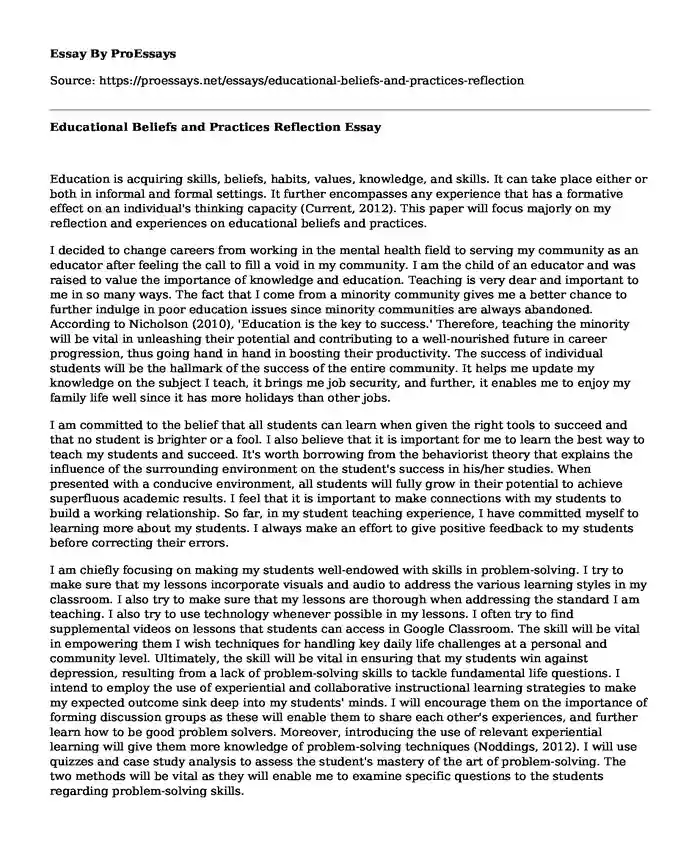Education is acquiring skills, beliefs, habits, values, knowledge, and skills. It can take place either or both in informal and formal settings. It further encompasses any experience that has a formative effect on an individual's thinking capacity (Current, 2012). This paper will focus majorly on my reflection and experiences on educational beliefs and practices.
I decided to change careers from working in the mental health field to serving my community as an educator after feeling the call to fill a void in my community. I am the child of an educator and was raised to value the importance of knowledge and education. Teaching is very dear and important to me in so many ways. The fact that I come from a minority community gives me a better chance to further indulge in poor education issues since minority communities are always abandoned. According to Nicholson (2010), 'Education is the key to success.' Therefore, teaching the minority will be vital in unleashing their potential and contributing to a well-nourished future in career progression, thus going hand in hand in boosting their productivity. The success of individual students will be the hallmark of the success of the entire community. It helps me update my knowledge on the subject I teach, it brings me job security, and further, it enables me to enjoy my family life well since it has more holidays than other jobs.
I am committed to the belief that all students can learn when given the right tools to succeed and that no student is brighter or a fool. I also believe that it is important for me to learn the best way to teach my students and succeed. It's worth borrowing from the behaviorist theory that explains the influence of the surrounding environment on the student's success in his/her studies. When presented with a conducive environment, all students will fully grow in their potential to achieve superfluous academic results. I feel that it is important to make connections with my students to build a working relationship. So far, in my student teaching experience, I have committed myself to learning more about my students. I always make an effort to give positive feedback to my students before correcting their errors.
I am chiefly focusing on making my students well-endowed with skills in problem-solving. I try to make sure that my lessons incorporate visuals and audio to address the various learning styles in my classroom. I also try to make sure that my lessons are thorough when addressing the standard I am teaching. I also try to use technology whenever possible in my lessons. I often try to find supplemental videos on lessons that students can access in Google Classroom. The skill will be vital in empowering them I wish techniques for handling key daily life challenges at a personal and community level. Ultimately, the skill will be vital in ensuring that my students win against depression, resulting from a lack of problem-solving skills to tackle fundamental life questions. I intend to employ the use of experiential and collaborative instructional learning strategies to make my expected outcome sink deep into my students' minds. I will encourage them on the importance of forming discussion groups as these will enable them to share each other's experiences, and further learn how to be good problem solvers. Moreover, introducing the use of relevant experiential learning will give them more knowledge of problem-solving techniques (Noddings, 2012). I will use quizzes and case study analysis to assess the student's mastery of the art of problem-solving. The two methods will be vital as they will enable me to examine specific questions to the students regarding problem-solving skills.
Conclusion
In conclusion, I believe that to further the student's problem-solving skills, there will be a need for me to build a cordial relationship with all the school's educational stakeholders since it will ensure school programs run smoothly. I intend to constantly act as a good leader but take a keen interest in their viewpoints and have serial meetings regarding the same.
References
Curren, R. (2012). Philosophy of education (1st ed.). Blackwell Publishing.
https://oecdedutoday.com/classroom-practices-and-teachers-beliefs-about-teaching/Nicholson, D. (2010). Philosophy of education in action (1st ed.).
https://www.jstor.org/stable/1163149?seq=1#metadata_info_tab_contentsNoddings, N. (2012). Philosophy of education (1st ed.). Westview Press.
https://www.greatschoolspartnership.org/proficiency-based-learning/about-pbl-simplified/beliefs-and-practices-of-proficiency-based-learning/
Cite this page
Educational Beliefs and Practices Reflection. (2024, Jan 25). Retrieved from https://proessays.net/essays/educational-beliefs-and-practices-reflection
If you are the original author of this essay and no longer wish to have it published on the ProEssays website, please click below to request its removal:
- Rubrics to Assess English Language Learners
- Case Study Example: Diabetic Type 1 in a Student
- Alyanz Nasser: Personal Statement
- Rhetorical Strategies in "The False Comfort of Securing Schools" Essay
- Essay Example on End of Term Thank You: Celebrating Your Child's Success
- Essay Example on Traditional vs. Remote Learning: Impact on Performance and Efficiency
- Ways of Teaching Foreign Language - Essay Sample







